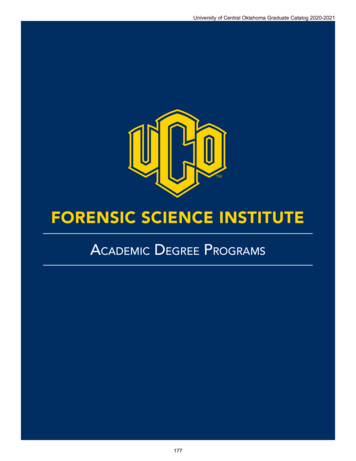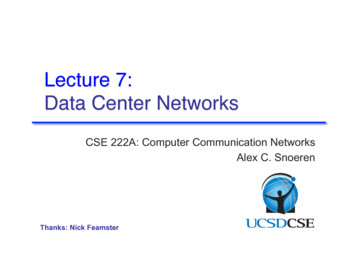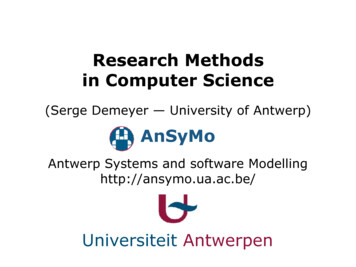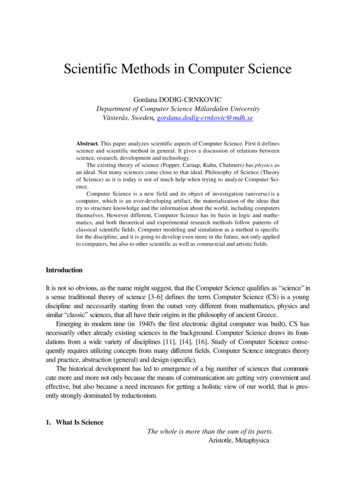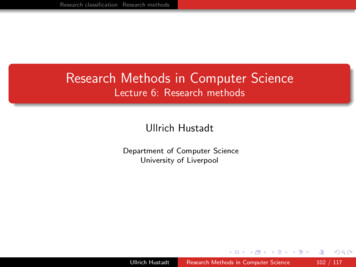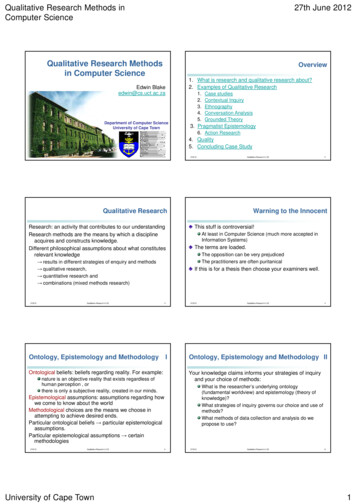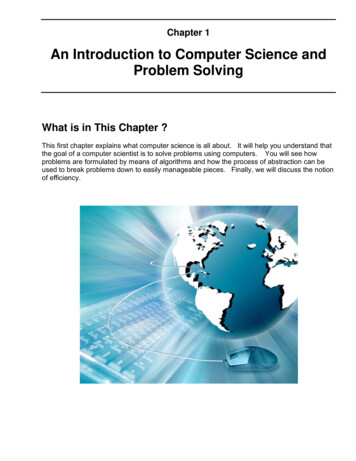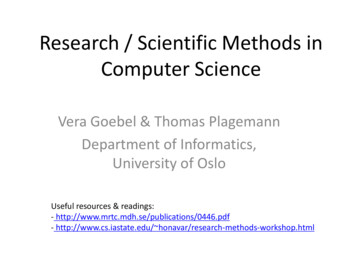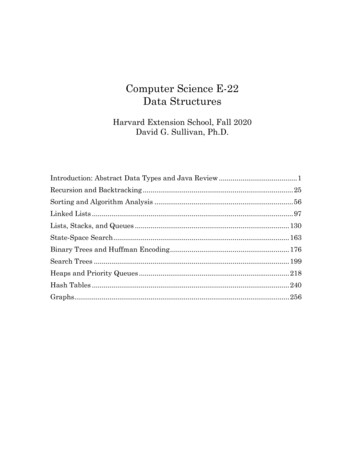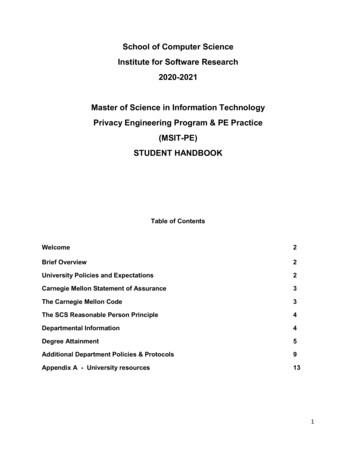
Transcription
School of Computer ScienceInstitute for Software Research2020-2021Master of Science in Information TechnologyPrivacy Engineering Program & PE Practice(MSIT-PE)STUDENT HANDBOOKTable of ContentsWelcome2Brief Overview2University Policies and Expectations2Carnegie Mellon Statement of Assurance3The Carnegie Mellon Code3The SCS Reasonable Person Principle4Departmental Information4Degree Attainment5Additional Department Policies & Protocols9Appendix A - University resources131
WelcomeWelcome to the MSIT-Privacy Engineering program. We have prepared this handbook toprovide some guidance about the requirements of your academic program as well as resourcesat Carnegie Mellon University (CMU).While this handbook is specific to your academic experience in the program, there are severalother resources and offices graduate students are encouraged to consult during their tenure atCarnegie Mellon University. Information about The Word, the student handbook, the GraduateEducation office, the Office of the Dean of Student Affairs and others are included in Appendix Aof this handbook.Brief OverviewThe Master of Science in Information Technology—Privacy Engineering (MSIT-PE)program is a full time masters program for students at Carnegie Mellon’s Pittsburgh campus.This degree is designed for computer scientists and engineers who wish to pursue careers asprivacy engineers or technical privacy managers. The degree requires 162 or 165 units tocomplete and offers two tracks: 12-month track (Privacy Engineering, 162 units) and the 16month track (Privacy Engineering Practice, 165 units). Designed in close collaboration withindustry and government, this program is intended for students who aspire to play a critical rolein building privacy into future products, services, and processes.The programs combine the best and most successful elements gleaned from Carnegie MellonUniversity’s long and distinguished history of professional masters programs. Offered jointly bythe School of Computer Science and College of Engineering, the program includes twosemesters of courses taught by leading academic privacy and security experts. The 12 monthtrack concludes with a summer-long learning-by-doing, capstone project, where students will bebrought in as privacy consultants to work on client projects. The 16 month track allows studentsthe option to work a summer internship and graduate the following December. Students whocomplete these programs will be well prepared for jobs as privacy engineers and technicalprivacy managers and will receive the degree of “Master of Science in Information Technology,Privacy Engineering”.University Policies & ExpectationsIt is the responsibility of each member of the Carnegie Mellon community to be familiar withuniversity policies and guidelines. In addition to this departmental graduate student handbook,the following resources are available to assist you in understanding community expectations: The Word/Student Handbook: demic Integrity Policy: ife/academic-integrity.html)University Policies Website: www.cmu.edu/policies/Graduate Education Website: T-PE Website: http://www.privacy.cs.cmu.eduPlease see Appendix A for additional information about The Word and University resources.2
Carnegie Mellon University Statement of AssuranceCarnegie Mellon University does not discriminate in admission, employment or administration ofits programs or activities on the basis of race, color, national origin, sex, handicap or disability,age, sexual orientation, gender identity, religion, creed, ancestry, belief, veteran status orgenetic information. Furthermore, Carnegie Mellon University does not discriminate and isrequired not to discriminate in violation of federal, state or local laws or executive orders.Inquiries concerning the application of and compliance with this statement should be directed tothe university ombudsman, Carnegie Mellon University, 5000 Forbes Avenue, Pittsburgh, PA15213, telephone 412-268-1018. Obtain general information about Carnegie Mellon Universityby calling 412-268-2000.Carnegie Mellon University publishes an annual campus security and fire safety reportdescribing the university's security, alcohol and drug, sexual assault and fire safety policies, andcontaining statistics about the number and type of crimes committed on the campus, and thenumber and cause of fires in campus residence facilities during the preceding three years. Youcan obtain a copy by contacting the Carnegie Mellon Police Department at 412-268-2323. Theannual security and fire safety report also is available online atwww.cmu.edu/police/annualreports.Information regarding the application of Title IX, including to admission and employmentdecisions, the sexual misconduct grievance procedures and process, including how to file areport or a complaint of sex discrimination, how to file a report of sexual harassment, and howthe university responds to such reports is available at www.cmu.edu/title-ix. The Title IXcoordinator may be reached at 5000 Forbes Ave., 140 Cyert Hall, Pittsburgh, PA 15213; 412268-7125; or tix@cmu.edu.The Carnegie Mellon CodeStudents at Carnegie Mellon, because they are members of an academic community dedicatedto the achievement of excellence, are expected to meet the highest standards of personal,ethical and moral conduct possible.These standards require personal integrity, a commitment to honesty without compromise, aswell as truth without equivocation and a willingness to place the good of the community abovethe good of the self. Obligations once undertaken must be met, commitments kept.As members of the Carnegie Mellon community, individuals are expected to uphold thestandards of the community in addition to holding others accountable for said standards. It israre that the life of a student in an academic community can be so private that it will not affectthe community as a whole or that the above standards do not apply.The discovery, advancement and communication of knowledge are not possible without acommitment to these standards. Creativity cannot exist without acknowledgment of the creativityof others. New knowledge cannot be developed without credit for prior knowledge. Without theability to trust that these principles will be observed, an academic community cannot exist.The commitment of its faculty, staff and students to these standards contributes to the highrespect in which the Carnegie Mellon degree is held. Students must not destroy that respect by3
their failure to meet these standards. Students who cannot meet them should voluntarilywithdraw from the university.The Carnegie Mellon Code can also be found on-line e School of Computer Science Reasonable Person PrincipleThe Reasonable Person Principle is part of the unwritten culture of CMU’ School of ComputerScience. It holds that reasonable people strike a suitable balance between their own immediatedesires and the good of the community at large. Everyone will be reasonable.Everyone expects everyone else to be reasonable.No one is special.Do not be offended if someone suggests you are not being reasonable.Reasonable people think about their needs, and the needs of others, and adjust their behaviorto meet the goals of a common good for the community, i.e. expressing what you want to say,but accepting and accommodating the needs of others.As applied to bulletin boards, this would include things like observing the explicit or implicitground rules about subject matter or tone. These vary from one bulletin board to another butusually include sticking to the expected subject matter and refraining from personal attacks.There are expectations, though. For example, cs.opinion is no-holds barred and often bothaggressive and personal.Not all people share the same model of reasonableness, so disagreements inevitably occur.Under the reasonable person principle, the first thing to do is work it out privately (perhaps inperson, since e-mail is known to amplify feelings). Indeed, many people would find it reasonableto bring in third parties before trying personal discussion.More generally, the reasonable person principle favors local, unofficial actions over formaladministrative ones. It assumes that people will be responsive when reminded of a conflict orasked to re-examine their behavior. It encourages requesting rather than demanding. And itleaves some room for the difference of opinion.Departmental InformationWhile the MSIT-PE program is offered jointly by the College of Engineering and the School ofComputer Science, it is administered by the Institute for Software Research (ISR) within theSchool of Computer Science (SCS).4
The SCS directory provides contact information for all faculty and staff in the schoolhttp://people.cs.cmu.edu.MSIT-PE DirectorsProf. Lorrie Cranor – Collaborative Innovation Center (CIC) 2107, lorrie@cs.cmu.eduProf. Norman Sadeh – Wean Hall (WeH) 5303, sadeh@cs.cmu.eduMSIT-PE StaffMs. Tiffany Todd – Collaborative Innovation Center (CIC) 2105 – ttodd@cs.cmu.edu – 412-2686367Ms. Linda Moreci (to schedule a meeting with Professor Sadeh) – Wean Hall (WeH) 4117 –laf20@cs.cmu.edu – 412-268-9934The following are additional information resources available to graduate students in theProgram. Department Directory: http://www.isri.cmu.edu/people/Information about CMU’s computer clusters: http://www.cmu.edu/computing/clusters/More specific information about the computer clusters in Wean Hall (Mac, Windows andLinux): ean.htmlInformation about CMU’s Graduate Student Organization is available at:http://www.cmu.edu/stugov/gsa/ . Feel free to contact Ms. Tiffany Todd for furtherinformation.Women@SCS (The Women@SCS mission is to create, encourage, and supportacademic, social, and professional opportunities for women in computer science and topromote the breadth of the field and its diverse community.):http://women.cs.cmu.eduSee Appendix A for a list of University resources for Graduate Students.Academic CalendarThe Academic Calendar can be found at https://www.cmu.edu/hub/calendar/index.html andprovides information on all deadlines including registration dates, class start dates, add/dropdeadlines, exam dates and more.Degree AttainmentThe MSIT Privacy Engineering program is a full-time masters program for students at CarnegieMellon's Pittsburgh campus. It requires 162 or 165 units to complete and offers two tracks: 12months (162 units) and 16 months (165 units). Students enrolled in the 12 month track willtypically begin in the fall semester, complete the program at the end of the following summer,and will graduate in August. Students that are enrolled in the 16 month track will typically beginin the fall semester and will complete the program at the end of the following fall to allow for asummer internship graduating in December. Students admitted to the program as part-timestudents should discuss their course schedule with the program directors. They will have theoption of completing the capstone project over two semesters. Regardless of the chosen track,all MSIT-PE students must complete a minimum of 162 units to graduate for the PrivacyEngineering Track, and 165 units for the Privacy Engineering Practice Track. In some cases,students who need additional technical coursework will enroll in those courses in the precedingspring or summer semester. In order to graduate, the following requirements must be met:5
1. 66 units of core courseso (17-662) Law of Computer Technology - 6 unitso (17-631) Information Security and Privacy - 12 unitso (17-733) Privacy Policy, Law, and technology – 12 unitso (17-731) Foundations of Privacy – 12 unitso (17-734) Usable Privacy and Security – 12 unitso (17-735) Engineering Privacy in Software – 12 unitso (17-609) Internship for Privacy Engineering – 3 units (taken during 16 monthtrack)2. Current Topics in Privacy Seminar - 3 units each in fall and spring semester. 3 units inthe fall semester for students returning from summer internship.3. 12 units of approved technical electives4. 30 units of approved general electives5. 48 unit privacy-by-design project course: Includes 6-unit Privacy-by-design Workshopcourse and 42 unit Privacy-by-design Practicum project6. GPA requirement: Student must maintain a 3.0 GPA in courses used for therequirements above.Students may take additional electives or substitute required courses when they have previouslytaken equivalent courses, if approved by the program directors. All students are expected totake the 48-unit privacy-by-design project course. In other words, no one will be exempted fromthe privacy-by-design project course requirement or allowed to take a substitute course.Similarly, no one will be exempted from taking the Current Topics in Privacy Seminar. A subsetof approved electives will be designated as “technical electives.” These electives provide indepth instruction related to a computer science area such as networking, machine learning, ordatabases. Students may also work on research projects for independent study credits that canbe counted towards the technical or general elective requirement with the approval of theProgram directors.Students are not permitted to take more than 60 units of courses in any semester unlesscleared with your academic advisor.The degree title that will appear on student diplomas will be Master of Science-InformationTechnology Privacy Engineering.A sample schedule for completing the program is provided at: http://privacy.cs.cmu.edu/plan/ .Drop/Add Withdraw procedures. Students taking undergraduate and Master’s level coursesmust follow the procedures and deadlines for adding, dropping, or withdrawing from courses asidentified on the academic calendar. Information can be found athttps://www.cmu.edu/hub/registrar/course- changes/index.html.Extra courses. Some students may need to take extra classes to address weaknesses in theirbackground, to fulfill prerequisites, or take extra classes simply because they are interested.Such courses will not count toward the technical elective requirement but may possibly counttowards the general elective requirement, subject to approval by the Program directors.Place-out Opportunities. Courses taken while students are enrolled as a CMU undergraduateor in another CMU graduate program can be used to satisfy a requirement. Students mayreplace these courses with additional electives based on consultation with the Program6
Directors. Students who have taken equivalent courses at other universities may petition theProgram Directors to use these courses in place of required courses and take additionalelectives instead.Normally, students will not receive credit towards graduation from MSIT-PE for any coursestaken prior to enrolling. However, in cases where these prior courses were taken at CarnegieMellon and were not used to satisfy an undergraduate or masters degree requirement, studentsmay petition to have credit granted towards graduation. Petitions will be considered on a caseby-case basis, taking into account the number of units, the student’s performance in thesecourses, and the additional courses they will take in the MSIT-PE program.Grade requirement. Students must earn a "B-" or better in a course for it to satisfy anyrequirement. Students cannot count pass/fail courses towards any graduation requirement.Students are welcome to switch a course to pass/fail but it will not count towards the total units.Independent Study. An “independent study” can be designed by the student and a faculty tocover the study of a particular area of interest to the student and is used when there is no formalcourse available in that subject area. Independent study is also used for students interested incontinuing to a Ph.D. degree since it offers the opportunity to work directly with a faculty member.Each independent study must be advised and approved by at least one faculty member, namelythe faculty member who takes responsibility for the supervision of the study. All independentstudies are also subject to approval by the Program Directors. Agreement to supervise anindependent study course is purely voluntary on the part of the supervising faculty member. Itis the duty of the student, therefore, to negotiate the terms and conditions of the independentstudy with the pertinent faculty members at CMU who will be supervising the study. Theseindividuals are referred to as “independent study supervisors.” Once the student findssomeone who agrees to supervise such a course, he/she must:1. Enter into an agreement with the supervisor that includes courseexpectations, including deliverables2. Secure the “Independent Study Contract Form” from the MSIT PE administrator3. Complete the form, giving brief description of the work to be done, includingdeliverables4. Secure signatures of both the student and the supervisor5. Return the form to the MSIT-PE administrator for review and approval by the ProgramDirectors.Independent study contracts must be submitted no later than 2 weeks following the start ofclasses.Internship Requirements. Students who wish to take a summer internship must be enrolled inthe MSIT-Privacy Engineering Practice 16 month track. This option is open to all students, USand International. International students who wish to take a summer internship must consultwith the Office of International Education for eligibility before seeking an internship or signing anoffer contract. More information on this option can be found on the Office of InternationalEducation website at: http://www.cmu.edu/oie/forstu/jobs.html.7
Expectations. Students are expected to enroll in the Current Topics in Privacy Seminar coursewhen returning from their internship in the Fall. Students will be required to write and present afinal report on the experience at the beginning of the Fall semester. Students who wish to enrollin a course that conflicts with the seminar may do so only with the approval from the programdirectors.Change of Grades and Missing Grades. If a grade has been assigned in error, it can bechanged to a different permanent grade. The procedure for changing a grade is as follows:1. Discuss the matter with the course instructor; provide evidence that the grade issuedwas not the grade earned.2. If the instructor agrees, the student should contact the program administrator toprocess a Change of Grade Form in order to correct the grade that was issued inerror. Generally, the instructor is the final authority for a course grade. Seehttp://www.cmu.edu/policies/ documents/Grades.html for more details.3. If a grade has not been assigned, please notify the course instructor for the completionof a Missing Grade Form.Statute of Limitations. The MSIT in Privacy Engineering degree must be completed within 5years from the time at which the student matriculates into the Program. Once this time-todegree limit has lapsed, the person may resume work towards the master’s degree only ifformally re-admitted into the Program.Under extraordinary circumstances, such as leave of absence, military or public service, familyor parental leave, or temporary disability, a school or college may, upon the relevantdepartment's recommendation and with the written approval of the dean (or designate), deferthe lapse for a period commensurate with the duration of that interruption. Students who arepursuing a master’s degree as part-time students for all semesters of their program, asapproved by their program, may also appeal to their program or department for extension of thetime to degree limit.Full-time Status and Part-time Status. Students admitted to the program as part-timestudents should discuss their course schedule with the program directors. They will have theoption of completing the capstone project
(MSIT-PE) STUDENT HANDBOOK . Table of Contents . Welcome 2 Brief Overview 2 . University Policies and Expectations 2 . Carnegie Mellon Statement of Assurance 3 . The Carnegie Mellon Code 3 . The SCS Reasonable Person Principle 4 . Departmental Information 4 . Degree Attainment 5 .


